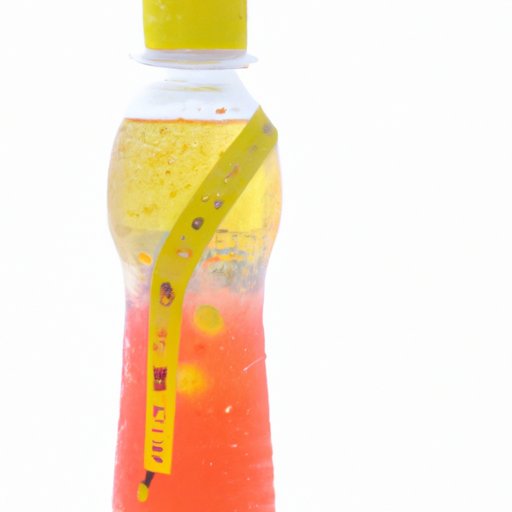
Introduction
There’s no denying that staying hydrated is important for our health, but with so many beverage options available on the market, it can be difficult to decide what to drink. One popular choice is vitamin water, which promises to provide you with added vitamins and minerals while also quenching your thirst. However, the question remains: Is vitamin water bad for you? In this article, we’ll explore the benefits and risks of consuming vitamin water, compare it to other popular beverages, examine consumer perception, closely examine the list of ingredients, address skepticism, suggest alternative options, and provide a final verdict.
Benefits and Risks
One of the biggest advantages of consuming vitamin water is that it can provide your body with added nutrients like vitamins and minerals. However, this benefit comes at a cost of added sugar and calories. According to the American Heart Association, men should consume no more than nine teaspoons (36 grams) of added sugar per day, while women should consume no more than six teaspoons (25 grams) per day. Unfortunately, a typical 20-ounce bottle of vitamin water can contain as much as eight teaspoons (33 grams) of added sugar. Those extra calories can lead to weight gain, which in turn can increase the risk of developing chronic diseases such as type 2 diabetes and heart disease.
However, studies have shown that consuming moderate amounts of added sugar does not necessarily lead to chronic health problems. In fact, vitamin water can be a useful addition to the diet of athletes or those who engage in intense physical activity. A sport drink like vitamin water can help replenish the body’s electrolytes and carbohydrates that are lost during exercise.
Comparison to Other Beverages
When it comes to comparing vitamin water to other popular beverages, it’s important to understand how they each affect our health. Soda, for example, is loaded with added sugar and calories, and consuming too much of it can lead to weight gain and an increased risk of chronic diseases. Juice can also contain added sugar and calories, but it can also provide a variety of vitamins and minerals that the body needs. Plain water, on the other hand, is always a healthy choice, as it contains no added sugar or calories and is essential for keeping our bodies hydrated.
So where does vitamin water fit in? It can provide added nutrients like juice while also hydrating the body like water. But consumers should be wary of the added sugar and calories, which can quickly add up over time. Experts recommend looking for low-calorie options or limiting intake to one bottle per day.
Consumer Perception
Many consumers perceive vitamin water as a healthy beverage choice because of the vitamins and minerals it contains. However, advertising and labeling on packaging can be misleading. For example, some vitamin water brands claim to promote weight loss or boost immunity, but these claims are often exaggerated. It’s important to read the label and nutrition facts to understand what you’re really consuming.
Additionally, the public may be misinformed about healthy beverage options. In a study conducted by the Centers for Disease Control and Prevention, it was found that 63% of people believe that fruit drinks like vitamin water are healthy choices, when in reality they can contain just as much added sugar as soda.
Ingredients
Closely examining the list of ingredients found in popular vitamin water brands can help consumers make more informed decisions about what to drink. Many brands contain ingredients like citric acid, natural flavors, and potassium citrate, which are harmless and often used to enhance flavor. However, some brands also contain high fructose corn syrup and artificial sweeteners, which have been linked to negative health effects such as weight gain and type 2 diabetes.
It’s important to look for vitamin water brands that have natural sweeteners like stevia or monk fruit, or those that have no added sugar at all. It’s also important to be aware of the serving size and limit intake to one bottle per day.
Address Skepticism
It’s understandable that some people may be skeptical about whether vitamin water is good for you. One of the biggest concerns is the added sugar and calories, but as previously stated, consuming vitamin water in moderation can be a healthy addition to the diet.
Another concern is the use of artificial sweeteners, which have been linked to negative health effects. However, studies have shown that moderate consumption of artificial sweeteners does not lead to adverse health outcomes. It’s important to understand that choosing a variety of healthy beverages, including vitamin water, can be part of a balanced diet.
Alternative Options
There are many alternative beverage options that are healthier than vitamin water. Natural drinks like coconut water or fresh fruit juice can provide added vitamins and minerals while also hydrating the body. Plain water with a squeeze of lemon or lime can also be a refreshing and healthy choice.
If you’re looking for a beverage that can provide added nutrients like vitamin water, consider drinking vitamin-infused water. These beverages are often low in sugar and calories and can provide a variety of added vitamins and minerals without the added sugar.
Conclusion
Overall, whether vitamin water is bad for you ultimately depends on how much you’re consuming and what the rest of your diet looks like. While it can provide added nutrients, it can also be loaded with added sugar and calories. Consumers should be aware of what they’re drinking and limit intake to one bottle per day. By choosing a variety of healthy beverages and paying attention to the list of ingredients, consumers can make informed decisions about what to drink and promote a healthier lifestyle.





